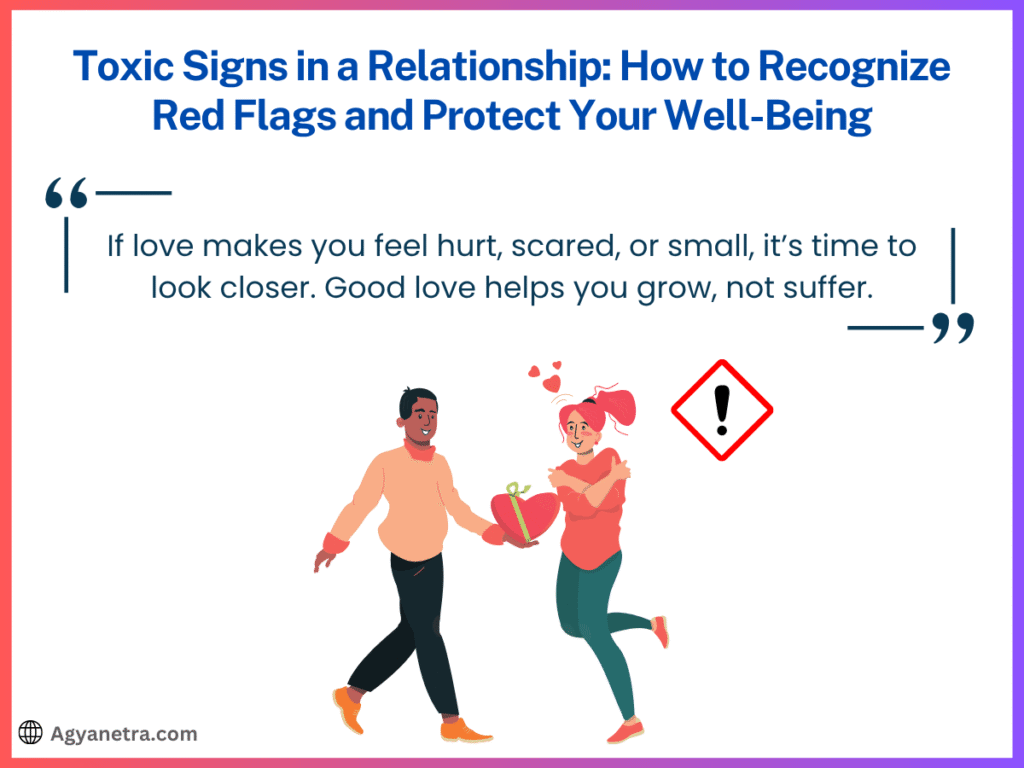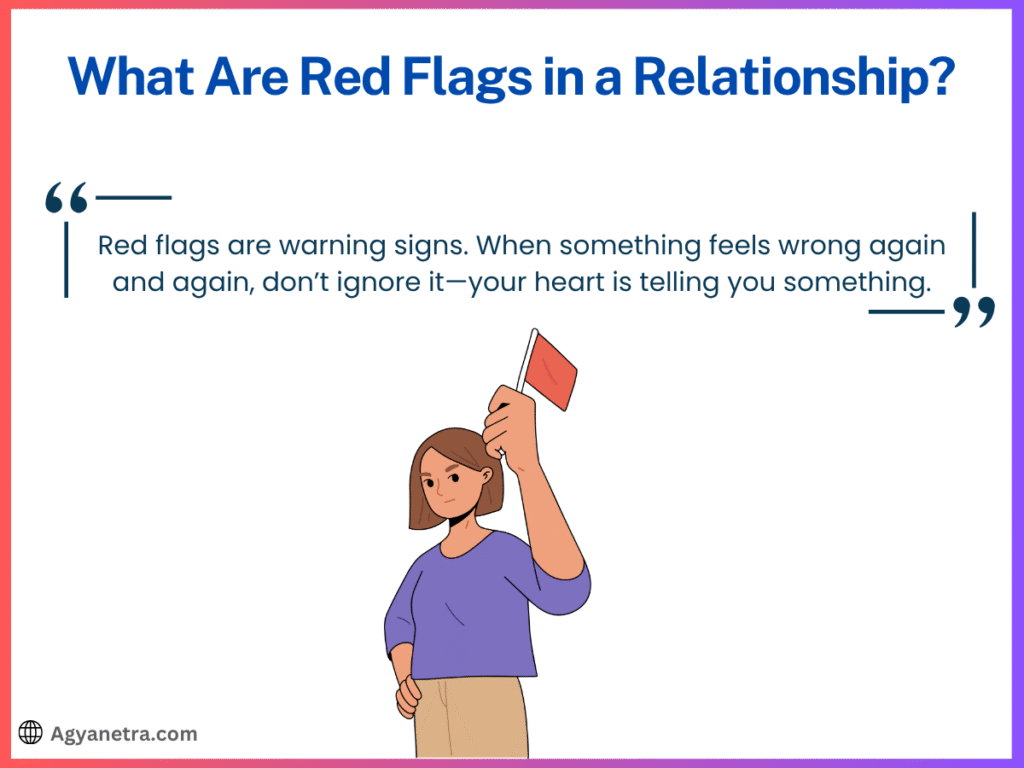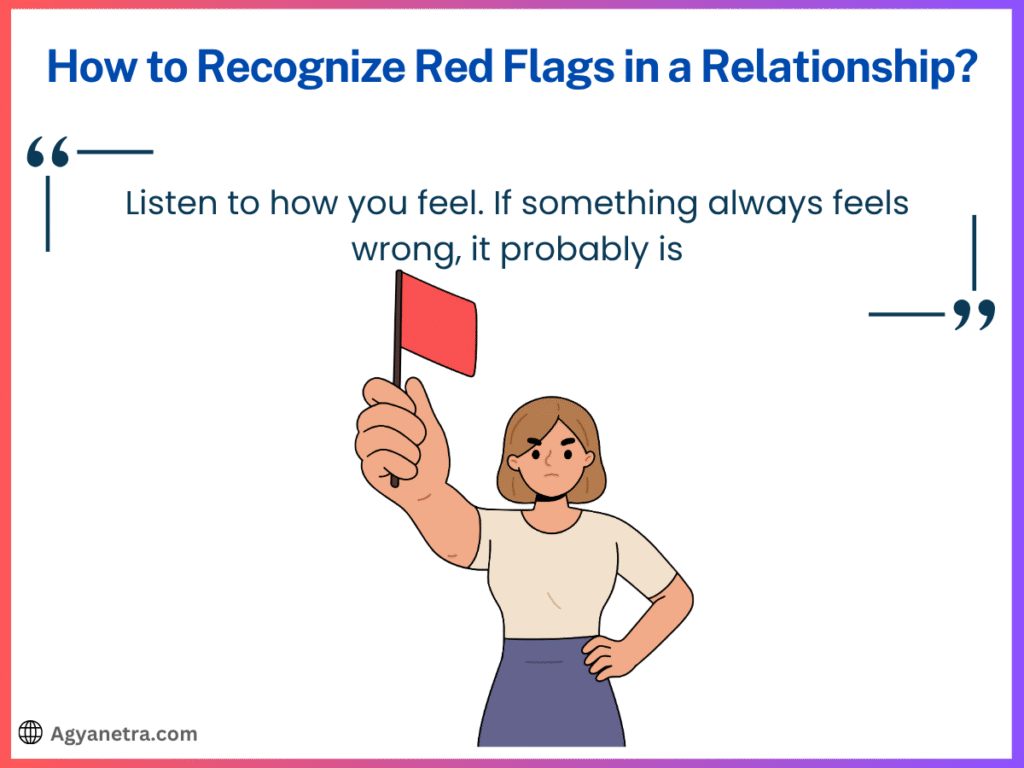What Are Red Flags in a Relationship? It play a big role in how we feel every day. They bring love, support, and companionship. But not all relationships are healthy. Some can drain your energy, lower your self-esteem, and affect your mental health.

This is why it’s so important to recognize toxic signs in a relationship early. Being aware of red flags helps you make better decisions and protect your emotional well-being.
Let’s explore what red flags in relationships look like, why they’re harmful, and how you can deal with them in a healthy and respectful way.
What Are Red Flags in a Relationship? 16 Warning Signs You Should Never Ignore
Red flags are warning signs that something may be wrong in your relationship. These signs can show up in your partner’s behavior, words, or actions.

Sometimes, they are subtle at first—like mild jealousy or occasional criticism—but over time, they can grow into serious problems. If these issues are ignored, they may lead to a toxic relationship, emotional harm, or even abuse.
Recognizing red flags is an important step toward building and maintaining a healthy relationship based on respect, trust, and mutual support.
1. Controlling Behavior
A healthy relationship is based on freedom and choice. But if your partner tries to control your actions, beliefs, or daily decisions, it’s a serious red flag.
For example, if your partner constantly tells you who to talk to, what to wear, or where to go, they may be showing controlling behavior. At first, it might seem like concern or love, but over time, it takes away your independence and confidence.
This kind of behavior can grow slowly, which is why many people don’t notice it right away. Always ask yourself: Do I feel free to be myself in this relationship?
2. Lack of Trust
Trust is the foundation of any strong relationship. If your partner doesn’t trust you and constantly questions your honesty, it can damage your bond.
You may notice signs like your partner checking your phone, asking where you are all the time, or accusing you without reason. This constant suspicion creates stress and insecurity, making the relationship unhealthy over time.
Healthy relationships are built on trust, not control or fear.
3. Jealousy That Doesn’t Stop
It’s natural to feel a little jealous sometimes. But when jealousy turns into constant doubt, accusations, or possessiveness, it’s not love—it’s a problem.
For example, if your partner gets upset every time you talk to a friend or coworker, or they need constant reassurance that you’re loyal, this jealousy becomes toxic. It can lead to emotional exhaustion and damage your self-worth.
4. Any Form of Abuse
Abuse can be physical, emotional, or mental. It is never acceptable in any relationship. While physical abuse is easier to spot, emotional abuse like constant criticism, manipulation, or name-calling can be just as damaging.
One example is gaslighting—when your partner denies things they said or did, making you question your own memory. Another is constantly putting you down or mocking you in front of others. These actions can break your confidence and lead to long-term emotional pain.
If you ever feel unsafe or deeply hurt, it’s important to reach out for help.
5. Gaslighting and Manipulation
Gaslighting is a serious red flag that can make you doubt your thoughts and emotions. If your partner keeps saying things like “you’re overreacting” or “that never happened,” even when you clearly remember the situation, they may be gaslighting you.
This behavior is often used to gain control and make you feel confused or powerless. Over time, it can lower your self-esteem and cause anxiety.
6. Constant Criticism
Feedback helps us grow, but constant criticism tears us down. If your partner is always pointing out your flaws, making fun of your looks, or saying you’re not good enough, that’s not helpful—it’s hurtful.
This kind of behavior can make you feel like you’re never enough. For example, if your partner criticizes the way you talk, dress, or do things—even when you try your best—it can lead to low self-esteem and emotional damage.
7. Isolation from Friends and Family
Your support system matters. If your partner tries to cut you off from friends or family, they may be trying to control or isolate you.
For instance, they might say things like “Your family doesn’t really care about you” or get upset when you make plans with friends. Slowly, you may find yourself feeling alone and dependent only on your partner. That’s not healthy.
A good relationship allows you to grow—not shrink.
8. Poor Communication
Communication is the heart of every relationship. When partners talk openly and honestly, it’s easier to solve problems and understand each other.
But if your partner avoids important conversations, gives you the silent treatment, or never expresses their feelings, it creates distance. For example, if your partner shuts down every time there’s a disagreement, it becomes harder to resolve issues.
Over time, this lack of communication can lead to misunderstandings and emotional disconnect.
9. Refusal to Compromise
A relationship should be a two-way street. Both people must be willing to listen, adjust, and meet halfway.
If your partner always wants their way, never considers your opinion, or shows no empathy, it signals a lack of respect. For example, if every plan must follow their preferences and they never ask what you want, that’s a sign of imbalance.
Healthy couples know how to compromise and support each other’s needs.
10. Ignoring Boundaries
Everyone has personal boundaries—whether it’s needing space, privacy, or time to yourself. A loving partner respects these limits.
If your partner pushes you into situations you’re uncomfortable with, checks your phone without permission, or insists on things you’ve said no to, they are crossing your boundaries. This can lead to anxiety, discomfort, and resentment.
Respecting boundaries is a key part of any safe and healthy relationship.
11. History of Infidelity
A partner’s past behavior can sometimes indicate future patterns. If someone has a history of cheating and hasn’t taken responsibility or changed, it may be a red flag.
This doesn’t mean people can’t change—but if they show signs of dishonesty, disrespect, or secretive behavior again, it may suggest deeper issues with commitment and loyalty.
12. Substance Abuse Problems
When a partner struggles with addiction and refuses help, it can affect your emotional and mental well-being. Substance issues often bring instability, mood swings, and neglect.
For example, if your partner’s drinking leads to arguments, broken promises, or irresponsible behavior, it can damage the trust and safety in the relationship.
Support is possible, but only when both people are willing to work on it.
13. Financial Irresponsibility
Money problems are common, but repeated careless spending, hiding debts, or refusing to plan finances together can be harmful.
If your partner keeps making risky choices, avoids bills, or spends beyond their means without talking to you, it creates stress and distrust. Shared goals need shared responsibility.
Financial health is an important part of a secure relationship.
14. Lack of Emotional Support
A healthy partner celebrates your wins and supports you in tough times. If they ignore your feelings, dismiss your achievements, or criticize your dreams, it can lead to feelings of loneliness—even when you’re in a relationship.
For example, if you share a personal struggle and your partner says, “It’s not a big deal,” it shows emotional neglect. Relationships thrive when both people feel seen, heard, and valued.
15. Frequent Lying
Even small lies can break the trust between partners. If your partner lies often—even about little things—it can create doubt and insecurity.
For instance, if they lie about where they were or who they were with, it’s hard to believe them about anything else. Honesty builds safety; lies break it.
16. Uncontrolled Anger
Anger is a normal emotion, but when it turns into yelling, threats, or violence, it becomes dangerous.
If your partner often loses their temper, punches walls, breaks things, or uses their anger to scare you, it’s a serious red flag. No one should live in fear in their own relationship.
Managing anger is a basic part of emotional maturity and respect.
More posts like this:
- How to Communicate Effectively in Relationships
- How to Build Strong Family Connections
- Signs of Romantic Obsession and How It Differs from True Love
- How to Rekindle Romance in Long-Term Relationships
- What Is the Best Parenting Advice for First-Time Parents
How to Recognize Red Flags in a Relationship?
Knowing the signs is the first step. But how can you become more aware and take action?

Start by reflecting on how the relationship makes you feel. Do you feel safe, respected, and supported? Or do you often feel anxious, confused, or small?
Talk to someone you trust—like a friend, family member, or therapist—about your concerns. Sometimes, an outside perspective helps you see things clearly.
Set clear boundaries and be honest about what you will and won’t accept. If your partner continues to ignore those boundaries, you have every right to step away.
Therapy—whether solo or together—can be a helpful tool. But if your partner refuses to take responsibility or work on the issues, it may be time to move on.
Your well-being comes first.
Final Thoughts: Toxic Signs in a Relationship
Toxic signs in a relationship aren’t always obvious at first. But over time, they show up as patterns of control, disrespect, emotional neglect, and dishonesty.
Learning to recognize red flags—like gaslighting, lack of trust, and constant criticism—helps protect your mental and emotional health.
Healthy relationships are built on love, trust, support, communication, and mutual respect. They help you grow and feel safe—not small or scared.
Always trust your instincts, honor your values, and remember this: You deserve a relationship that brings peace, not pain.
If you ever feel stuck or unsure, reach out to someone you trust or seek professional help. Recognizing the signs, setting boundaries, and walking away when needed is not weakness—it’s strength.
FAQs
What are red flags in a relationship?
Red flags are warning signs that something may be wrong in a relationship. They can be behaviors like controlling you, lying often, or disrespecting your boundaries. Noticing these early can protect your mental and emotional health.
How do I know if I’m in a toxic relationship?
If you feel scared, stressed, unsupported, or constantly put down by your partner, you may be in a toxic relationship. Trust your feelings. Healthy relationships make you feel safe and respected.
What is gaslighting in a relationship?
Gaslighting is when your partner makes you question your own memory or feelings. For example, they may deny things they clearly said or make you feel like you’re “too sensitive.” It’s a form of emotional abuse.
What should I do if my partner doesn’t respect my boundaries?
alk openly and tell them what makes you uncomfortable. If they keep pushing your limits or dismissing your needs, that’s a serious red flag. Respect must go both ways in a healthy relationship.
Can a person change after cheating?
Some people do change, but trust takes time to rebuild. If your partner shows honesty, takes full responsibility, and is willing to earn back your trust, it might work. But repeated cheating is a big warning sign.
What if my partner refuses to talk about problems?
Communication is key in any relationship. If your partner avoids talking or shuts you out when there’s a problem, the issues will only grow. A partner who cares will try to work through things with you.
Should I leave the relationship if red flags don’t change?
Yes, if you’ve clearly expressed your concerns, tried to fix things together, and nothing improves, it’s okay to walk away. Your peace and well-being come first.
Who can I talk to if I feel stuck in a toxic relationship?
Talk to a trusted friend, family member, or therapist. You don’t have to go through it alone. Getting an outside view can help you see things more clearly and take the next steps.

Vidushi Gupta is a certified spiritual coach, energy healer, and emotional wellness counselor with over 10 years of experience guiding people through spiritual signs, emotional healing, and inner transformation. Her approach is grounded, fear-free, and focused on helping readers understand spiritual experiences with clarity and emotional balance.
With a background as a digital content strategist and published author of nearly ten novels, Vidushi has reached over 20 million readers worldwide through her writing. She is known for explaining complex spiritual ideas in simple, relatable language, making topics like repeating signs, intuitive shifts, and spiritual awakenings easier to understand and trust.
Through her work, she helps people connect everyday life experiences to deeper inner growth—gently, honestly, and without superstition.
Accuracy, Fact-Checking & Expert Oversight: Vidushi Gupta.
